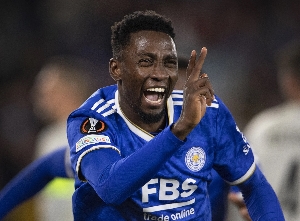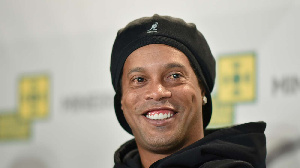Transfer: Palmer names five clubs chasing Wilfred Ndidi

A conflict in Sudan that erupted a year ago has wreaked havoc across swathes of the country, unleashed waves of ethnic violence in Darfur, driven millions into extreme hunger, and created the world’s largest displacement crisis.
What triggered the violence?
Tensions had been building for months before fighting between Sudan’s army and the paramilitary Rapid Support Forces (RSF) erupted in the capital Khartoum on April 15, 2023.
The army and RSF had been in a fragile partnership after toppling a civilian government in an October 2021 coup, a move that derailed a transition from the rule of Islamist autocrat Omar al-Bashir, who was ousted amid a popular uprising in 2019.
The rivalry between the two sides burst into the open over an internationally backed plan that would have launched a new transition with civilian parties and was due to be sealed just before the war broke out.
Both the army and the RSF were required to cede power under the plan and two issues proved especially contentious. One was the timetable for the RSF to be integrated into the regular armed forces. A second was the chain of command between the army and RSF leaders and the question of civilian oversight.
The warring parties have also competed with sprawling business interests that reach beyond Sudan’s borders.
Who are the main players on the ground?
The protagonists in the power struggle are General Abdel Fattah al-Burhan, head of the army and leader of Sudan’s ruling council since 2019, and his former deputy on the council, RSF leader General Mohamed Hamdan Dagalo, commonly known as Hemedti.
The whereabouts of the two men were often unclear in the early stages of the conflict as fighting subsumed Khartoum. Later, Burhan began to make public appearances in Sudan, as the army and allied government ministries established a presence in the Red Sea city of Port Sudan.
Both Burhan and Hemedti travelled outside the country to rally support.
Hemedti, who grew wealthy through gold mining and other ventures, is the undisputed leader of the RSF. Members of his family and clan play leading roles and the force’s support base is the western region of Darfur, where the RSF emerged from militias that fought alongside government forces to crush rebels in a brutal war that escalated after 2003.
Hemedti has also courted some civilian politicians who were involved in plans for a democratic transition before the war.
Analysts say Burhan’s position is less assured at the head of the army, where Islamist-leaning Bashir loyalists and veterans have gained sway since the 2021 coup.
The RSF routinely says it is fighting to rid Sudan of remnants of Bashir’s regime, while the army says it is trying to protect the state against “criminal” rebels.
Witnesses say the RSF and its allies have committed extensive abuses including ethnically targeted killings, sexual violence, and looting. Residents have accused the army of killing civilians in indiscriminate shelling and air strikes. Both sides have largely denied the accusations against them.
Who is winning?
Though Sudan’s army has superior resources, including air power and an estimated 300,000 troops, the RSF has grown in recent years into a well-equipped force of some 100,000 deployed around the country.
In the first days of the war, the RSF’s more nimble units were embedded in neighbourhoods across the capital. Towards the end of 2023, the RSF made a series of rapid advances to consolidate its grip on Darfur and take over El Gezira state south of Khartoum, a key agricultural area.
More recently, however, the army has regained some footing, making its most significant advances to date in Omdurman, one of the three cities that make up the wider capital.
What’s at stake?
The uprising that led to Bashir’s overthrow had raised hopes that Sudan and its population of 49 million could emerge from decades of autocracy, internal conflict, and economic isolation.
But a year of warfare has inflicted massive infrastructure damage, forced more than 8.5 million people from their homes, and driven almost 5 million people to near-famine conditions.
Homes, offices, warehouses, and banks have been widely looted, hospitals put out of service, and trade and farming disrupted. Thousands of civilians have been killed – death toll estimates are highly uncertain – and both sides have been accused of committing war crimes.
Aid agencies say fighting, looting and bureaucratic hurdles have severely hampered the delivery of relief.
Intensified political and ethnic rivalries within Sudan have led to fears that the country, Africa’s third largest by area, could splinter, destabilising a volatile region bordering the Sahel, the Red Sea, and the Horn of Africa.
Hundreds of thousands of people have fled to Egypt, Chad, and South Sudan, with smaller numbers crossing into Ethiopia and the Central African Republic.
Both sides have been using gold, Sudan’s most valuable and widely smuggled resource, to support their war effort.
What’s the role of foreign states?
The conflict has played into competition for influence in Sudan and the surrounding region among regional and global powers including the United Arab Emirates, Saudi Arabia, Egypt, Ethiopia, Iran and Russia.
Gulf states have previously pursued investments in sectors including agriculture, where Sudan holds vast potential, and ports. Russia has been seeking to build a naval base on Sudan’s Red Sea coast.
The UAE has provided arms to the RSF, according to reporting by UN experts, while sources say Iran has flown in military support for the army.
Egypt, itself ruled by military man President Abdel Fattah al-Sisi who overthrew his Islamist predecessor, has deep ties to Burhan and the army.
Western powers, including the United States, had swung behind the transition towards democratic elections following Bashir’s overthrow. Diplomatic attention on Sudan has been limited by the wars in Ukraine and Gaza.
What efforts have been made to end the war?
Last year Saudi Arabia and the United States brought delegations from both factions to Jeddah for talks, but the ceasefires agreed there were repeatedly violated, and the process faltered.
Other initiatives have been launched by the African regional grouping Igad and by Egypt, leading to concern about overlapping diplomatic efforts and rivalry.
Fighting has continued in past weeks despite appeals for a ceasefire from the UN Security Council and Secretary General during the holy Muslim month of Ramadan
The recently appointed US special envoy for Sudan is pushing for a restart of talks this month in Jeddah.
Paris is hosting a donors’ conference on April 15 to try to mobilize aid funding and secure more access for humanitarian workers.
Source: theeastafrican.co.ke





